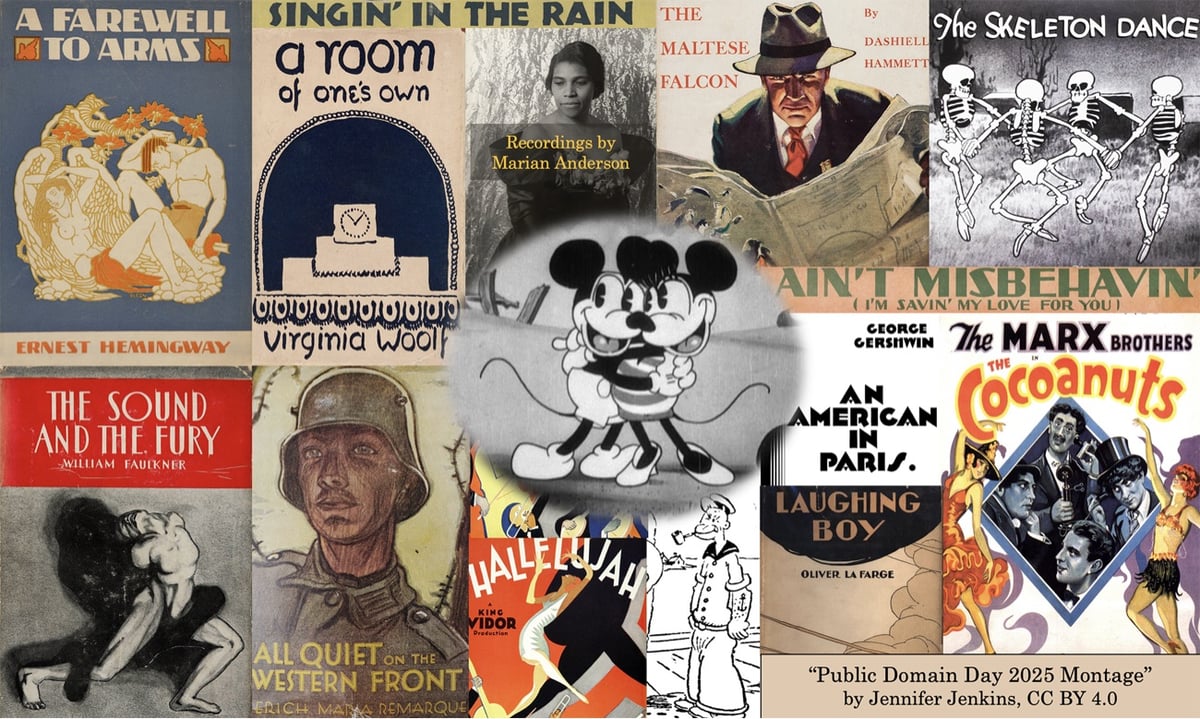Happy Public Domain Day!

Yesterday was Public Domain Day and Duke University’s Center for the Study of the Public Domain has the scoop on what works entered the public domain in the US on January 1, 2025. They include:
- William Faulkner, The Sound and the Fury
- Ernest Hemingway, A Farewell to Arms
- Virginia Woolf, A Room of One’s Own
- Dashiell Hammett, The Maltese Falcon (as serialized in Black Mask magazine)
- Agatha Christie, Seven Dials Mystery
- Rainer Maria Rilke, Letters to a Young Poet (only the original German version, Briefe an einen jungen Dichter)
- A dozen more Mickey Mouse animations (including Mickey’s first talking appearance in The Karnival Kid)
- The Cocoanuts, directed by Robert Florey and Joseph Santley (the first Marx Brothers feature film)
- The Skeleton Dance, directed by Walt Disney and animated by Ub Iwerks (the first Silly Symphony short from Disney)
- Spite Marriage, directed by Edward Sedgwick and Buster Keaton (Keaton’s final silent feature)
- E. C. Segar, Popeye (in “Gobs of Work” from the Thimble Theatre comic strip)
- Hergé (Georges Remi), Tintin (in “Les Aventures de Tintin” from the magazine Le Petit Vingtième)
- Singin’ in the Rain, lyrics by Arthur Freed, music by Nacio Herb Brown
- Ain’t Misbehavin’, lyrics by Andy Paul Razaf, music by Thomas W. (“Fats”) Waller & Harry Brooks (from the musical Hot Chocolates)
- An American in Paris, George Gershwin
- Rhapsody in Blue, recorded by George Gershwin
The Internet Archive is hosting several of the newly sprung works, free for you to remix, reuse, misuse, and generally do whatever you would like with. Huzzah!
Oh, and here’s why the public domain matters:
The public domain is also a wellspring for creativity. You could think of it as the yin to copyright’s yang. Copyright law gives authors important rights that encourage creativity and distribution — this is a very good thing. But the United States Constitution requires that those rights last only for a “limited time,” so that when they expire, works go into the public domain, where future authors can legally build on the past — reimagining the books, making them into films, adapting the songs and movies. That’s a good thing too! It is part of copyright’s ecosystem. The point of copyright is to promote creativity, and the public domain plays a central role in doing so.
How does the public domain feed creativity? Here are just two examples from 2024. You may have enjoyed the film Wicked in 2024. Like many of its predecessors, it is based on L. Frank Baum’s The Wonderful Wizard of Oz books, and it offers origin stories for the Wicked Witch of the West and Glinda the Good. From the literary realm, Percival Everett’s 2024 novel James reimagines Mark Twain’s Adventures of Huckleberry Finn from the perspective of Jim, Huckleberry’s friend who is an escaped slave. The novel won the 2024 National Book Award and Kirkus Prize and was a finalist for the Booker Prize. As summed up by a New York Times review: “‘Huck Finn’ Is a Masterpiece. This Retelling Just Might Be, Too.” Mark Twain famously wanted copyright to last forever — if he had his wish, would his heirs have sued Everett? Thankfully, we did not have to find out, and Everett could publish James without such litigation.





Comments 0
Hello! In order to comment or fave, you need to be a current kottke.org member. If you'd like to sign up for a membership to support the site and join the conversation, you can explore your options here.
Existing members can sign in here. If you're a former member, you can renew your membership.
Note: If you are a member and tried to log in, it didn't work, and now you're stuck in a neverending login loop of death, try disabling any ad blockers or extensions that you have installed on your browser...sometimes they can interfere with the Memberful links. Still having trouble? Email me!
In order to comment or fave, you need to be a current kottke.org member. Check out your options for renewal.
This is the name that'll be displayed next to comments you make on kottke.org; your email will not be displayed publicly. I'd encourage you to use your real name (or at least your first name and last initial) but you can also pick something that you go by when you participate in communities online. Choose something durable and reasonably unique (not "Me" or "anon"). Please don't change this often. No impersonation.
Note: I'm letting folks change their display names because the membership service that kottke.org uses collects full names and I thought some people might not want their names displayed publicly here. If it gets abused, I might disable this feature.
If you feel like this comment goes against the grain of the community guidelines or is otherwise inappropriate, please let me know and I will take a look at it.
Hello! In order to leave a comment, you need to be a current kottke.org member. If you'd like to sign up for a membership to support the site and join the conversation, you can explore your options here.
Existing members can sign in here. If you're a former member, you can renew your membership.
Note: If you are a member and tried to log in, it didn't work, and now you're stuck in a neverending login loop of death, try disabling any ad blockers or extensions that you have installed on your browser...sometimes they can interfere with the Memberful links. Still having trouble? Email me!